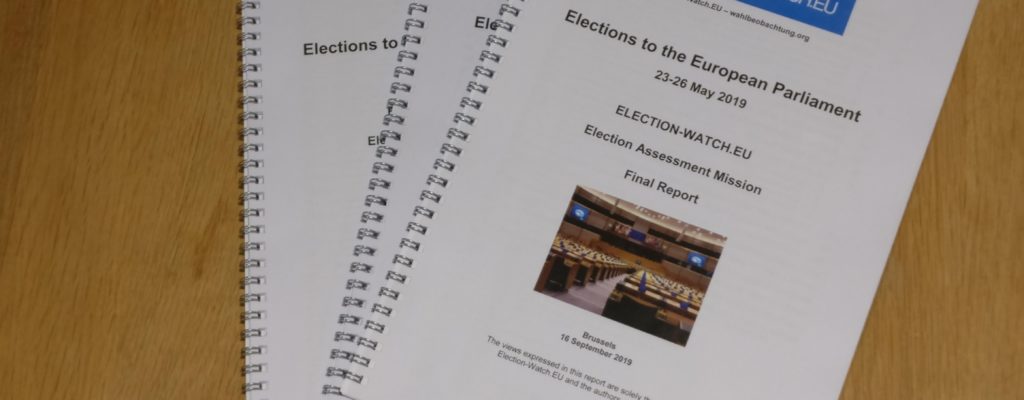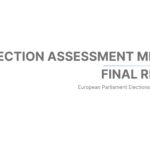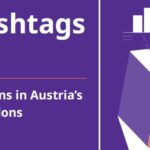
European Parliament Elections 2019: Election-Watch.EU EAM Final Report with 16 recommendations
Brussels, 16 September 2019: For the first time, European Parliament elections were observed by a comprehensive citizen-led Election Assessment Mission (EAM) with 28 national chapters, comprising 65 international election experts and observers, as well as eight like-minded citizen election observer organisations. The Mission focused on specific areas to evaluate the coherence of the EU Member States’ electoral processes. These areas included the right to vote and the right to stand as a candidate, electoral calendars, voter registration, campaign finance, social media regulation, and participation of persons with disabilities. The EAM followed established election observation methodology, used international standards and regional human rights commitments as references, and has been carried out on a pro bono basis across the EU.
The 2019 European Parliament elections marked a robust exercise in democratic practice, with clear indications where improvements could be made. Fears of foreign interference in the elections, of a strong performance of EU-critical populist right wing parties, as well as disinformation campaigns did not materialise to the anticipated degree. However, perpetual monitoring and continuous development to uphold and protect electoral integrity are important to guarantee the exercise of civil and political rights to citizens. European responses need to increase equality, inclusion, transparency and accountability of electoral processes.
The diversity of electoral regulation and practices across the EU has demonstrated both the richness and complexity of the European electoral heritage and that many electoral processes would benefit from greater cohesion. During its last term, a proposal for electoral reforms was developed in the European Parliament with the aim of highlighting the European significance of the electoral process and of further harmonising it across the Member States. The proposed reforms either did not find a majority in the outgoing European Parliament, like the introduction of transnational lists, or were supported by the majority of MEPs but not by the European Council, like the introduction of a common minimum voting age of 16. Election-Watch.EU provides this report with 16 recommendations as a comprehensive reference document for potential future electoral reforms and follow-up advocacy ahead of the next European elections.
Election-Watch.EU conducted this Election Assessment Mission with the objective of contributing to European electoral integrity, raising awareness of the importance of the European elections, promoting good practices and providing recommendations to further strengthen European electoral processes. An underlying objective is to strengthen civic engagement in European elections, with a special focus on youth participation. EU governments and political parties need to demonstrate commitment to UN, EU and OSCE principles by recognising the value of non-partisan election observation, not only outside the EU, but also within Europe, to further strengthen European democracies.
Election-Watch.EU EAM EP 2019 Final Report
 Election Assessment Mission Report with good practice examples published
Election Assessment Mission Report with good practice examples published
 Presenting Electoral Reform Paper at the Electoral Integrity Project Conference
Presenting Electoral Reform Paper at the Electoral Integrity Project Conference
 Social media monitoring of Austria’s general election campaign
Social media monitoring of Austria’s general election campaign
 How best to assess hybrid threats in elections?
How best to assess hybrid threats in elections?
 Telegram and its role in Austria’s 2024 election
Telegram and its role in Austria’s 2024 election